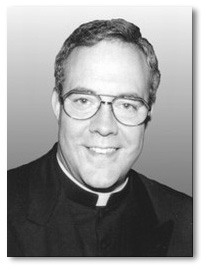Religious faith promotes liberty, not intolerance
- ROBERT A. SIRICO
From political commentary to best-selling books, the message is that religion is a plot against free thought and an attempted imposition of doctrine and morals from on high.
 < < |
Rev.
Robert A. Sirico
|
Frenzied fear mongers have sounded warnings about the despotism that the red states are plotting to shape up the blues, while the best-selling book The Da Vinci Code imagines a vast conspiracy stretching back to the earliest Christian centuries to control our lives and minds.
How often do these same people give images of faithful people standing up for human rights and freedom? Hardly ever. I am certain my sense of things is shared by vast numbers of voters who see their freedom, their rights and their faith as part of a single package. This is a view closer to reality.
Consider a scene I witnessed last year in rural China. Several dozen Catholics gathered for Mass in a church, quietly praying and preparing to receive the Eucharist, ever watchful of the dangers of a government that frowns on their faith. Evangelicals experience the same, as do many alternative religions in China. Decades of oppression haven't slowed the growth of churches; it has attracted more converts who are willing to take a risk in defense of their right to pray and worship.
When people are left alone to manage their own affairs, whether commercial or religious, we've all learned to expect miracles. Economists understand this well; it is time religious intellectuals realize it, too.
These images of faith as a refuge from control stretch back in history. Religion was the driving force that led to the overthrow of socialism in Eastern Europe, of Jim Crow in the South, of slavery before that, and the prime motivation for why the American colonies were settled.
Faith grants the courage and conviction that are necessary to stand up to overlords. Since ancient times, religious leaders have demanded of public authorities to "let my people go," which was a Bible verse (Exodus 5:1) long before it was a song.
That is not the image of religion we have today. Religion and human rights are likely to be seen as antagonistic.
There are many reasons why this is a wrong view. Faith imparts a conviction that the creative hand of God made every person in his image and likeness. This implies that every person possesses an inherent dignity that must not be violated, and a belief that whatever you do to the least of even the poor and weak, you have done to their creator as well.
Religious people tend to look to God and not the state for their authority, which is one reason why intellectuals such as Jean-Jacques Rousseau and Karl Marx distrusted Christianity in particular.
As for the institutions of worship, history has shown that they need nothing from the state other than the freedom to exist. The alliance of church and state that is a part of Christian history led to gravely unfortunate results for both institutions. But the alliance of secular ideology and state proved supremely dangerous to people of faith living under communism, Nazism and other forms of secular totalitarianism.
This history is not at all lost on those groups of voters in the red states that are routinely denounced for their intolerance and narrow mindedness. My experience with evangelicals in this country belies these stereotypes. What I see is not rabid fundamentalists itching for a chance to bring on Armageddon but millions and millions of people who only want to practice their faith in freedom and live their ideals.
The free exercise of faith should not be alarming, threatening or otherwise dangerous. Our nation was built on a faith, which is good for freedom, good for society, and good for souls.
 This is Meaghen Gonzalez, Editor of CERC. I hope you appreciated this piece. We curate these articles especially for believers like you.
This is Meaghen Gonzalez, Editor of CERC. I hope you appreciated this piece. We curate these articles especially for believers like you.
Please show your appreciation by making a $3 donation. CERC is entirely reader supported.

Acknowledgement
Rev. Robert A. Sirico. "Religious faith promotes liberty, not intolerance ." Detroit News: Faith and Policy (February 5, 2005).
Reprinted with permission of the author Rev. Robert A. Sirico.
The Author

 Father Sirico is president of the Acton Institute for the Study of Religion and Liberty in Grand Rapids, Mich. Father Sirico is often called upon by members of the broadcast media for statements regarding economics, civil rights, and issues of religious concern. He is the author or co-author of Defending the Free Market: The Moral Case for a Free Economy, The Call of the Entrepreneur Study Guide, Catholicism Developing Social Teaching, The Free Person and the Free Economy: A Personalist View of Market Economics, Capitalism, Morality & Markets, Skepticism, Faith, and Freedom, A Moral Basis for Liberty, Catholicism's Developing Social Teaching, and Environmentalism and its Spiritual Implications.
Father Sirico is president of the Acton Institute for the Study of Religion and Liberty in Grand Rapids, Mich. Father Sirico is often called upon by members of the broadcast media for statements regarding economics, civil rights, and issues of religious concern. He is the author or co-author of Defending the Free Market: The Moral Case for a Free Economy, The Call of the Entrepreneur Study Guide, Catholicism Developing Social Teaching, The Free Person and the Free Economy: A Personalist View of Market Economics, Capitalism, Morality & Markets, Skepticism, Faith, and Freedom, A Moral Basis for Liberty, Catholicism's Developing Social Teaching, and Environmentalism and its Spiritual Implications.




